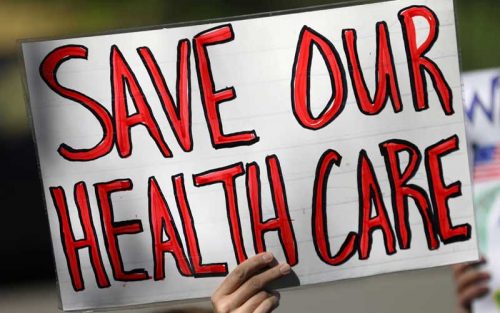
I am sending this memo to each of you, not as a local party official or conservative activist, but as a concerned constituent who has been following the current health-care debate as closely as any other citizen. It appears that the seven-year long effort to address the Democrat’s ill-conceived health-care albatross is finally reaching a climax and the very complexity of Obamacare is making it difficult for you all to find a consensus as to how to fix the mess the Democrats made.
With all due humility, I ask that you consider a simple approach now: repeal of Obamacare, effective two years from enactment; and a commitment to create a two-tiered system of private, employer-provided insurance for the employed (with certain basic requirements, such as coverage for pre-existing conditions and continued coverage for dependents), and Medicare for everyone else. If this system is coupled with fundamental corporate and middle-class tax reform, it could provide the certainty that our private economy needs to sustain the level of economic growth needed to address so many other issues we now face, while making our public health system more efficient and sustainable.
Everyone has discussed and debated how we got to this point, but let’s remember this—too many Americans have structured their lives based on the existence of private insurance when employed, and a social safety net when they are not employed, to create a totally free-market based system now. However, unlike European countries and other nation-states, the existence of a vast private insurance system has allowed our country to meet defense and security commitments that it could not otherwise afford if it had to underwrite a national single-payer system, while providing the capital for the research, development and delivery of medical practices and medicines that has lead the way to the greatest extension of life-expectancy in human history. Moreover, the existence of a thriving private-insurance industry provides our private economy with a vast source of capital from premium income for investment and growth, which a single-payer system would extinguish. In the meantime, though, state budgets have become overburdened by the under-funded Medicaid mandates, and our federal bureaucracy has shown itself to be too incompetent to meet our national commitment to provide even the most basic medical care for veterans, Native Americans and other specific groups. Simply put, the idea of a single-payer or provider system does not fit the United States, and the United States needs its private insurance industry.
The simple reform plan would be consistent with the institutional competence of our limited federal government, and would provide the framework for a more efficient and effective delivery system for medical care. This plan would have three basic parts:
- an employer-provided private insurance market protected by the federal tax code for everyone who is employed, including a pooled market for the self-employed;
- a means-tested reimbursement structure for the unemployed, the disabled, the poor, the retired, veterans, and Native Americans; and
- a re-insurance trust fund to underwrite treatment expenses catastrophic illnesses or traumas, that our beyond the ability of the private insurance market to cover.
Both the Medicare and re-insurance trust would be funded through a revised Medicare tax program. Committing to such a system should be coupled with repeal of Medicaid in its entirety, and closure of the federal VA and Native American hospitals and clinics (though the Defense Department should still maintain a network of hospitals for the treatment of our soldiers), and with the lowering of the corporate tax rate to a flat 15{997ab4c1e65fa660c64e6dfea23d436a73c89d6254ad3ae72f887cf583448986} (or lower) rate to provide businesses of all sizes the ability to pay for private insurance plans and remain competitive. Moreover, state and local governments could still supplement this system through their own re-imbursement or direct-care alternatives, but they would be relieved of the immense financial burden that is sapping their resources to provide for education and other programs within their sphere of responsibility.
I know this is not an ideologically pure free-market system, but we haven’t had that type of system at any time during our lifetimes, and it is too late to change our whole country’s expectations to fit our ideology. And, of course, the devil would still be in the details of such a system, but at least it would provide a certain plan to debate and implement over the next two years while Obamacare is unwound—and parts of it should draw some bipartisan support, which any program of such reach should have had from the beginning.
Again, this is one citizen’s recommendation—but, if one lonely conservative can describe and recommend such a simple and comprehensive idea, I have to believe you all can get together and finally address the health-care issue.

Well said. You are the voice of common sense conservatism that makes following this blog worthwhile.
Just before Obama came on the scene there were actual objectives being pursued to allow people to better manage their health care costs. Things like health savings accounts, giving self employed the same kind of expense write-offs that business got, allowing for purchasing insurance across state lines and so on.
Each state had their own medicaid and risk pool programs to help those with catastrophic illness or handicaps.
Now we’re left with nibbling around the edges of enshrining government controlled insurance? Count me out. This will lead to the nation becoming exactly what our cities have become. Giant welfare schemes that provide lackluster bennies like dirty water, crumbling sewers and roads, police that barely have enough resources to respond and none to prevent crime and so on. All of our resources will be consumed in order to provide limited health care that is smothered by government regulation and overhead.
The people paying for this mess will be afforded the same crap outcomes that the least among us will be afforded while our public servants remain exempted from it..
The citizens of this nation need to get the notion in their collective heads that health insurance is not a right. We are going to see a huge reduction in access when bright young people see getting a medical license to practice as a bad career option. What happens when the concepts of supply and demand ripples through that vein of the economy?
The system you propose is similar to that used in Switzerland and The Netherlands. In Switzerland, all companies issuing health insurance policies must issue a basic policy with premiums set at no profit. The profit comes from add ins (you don’t want to be in a ward, well, a two-person room is so much per month extra and a private room so much more). People who can’t afford the basic policies have their premiums paid by the Canton.
In The Netherlands, everyone making more than a specific amount annually must have insurance from his employer. People earning less get state paid insurance.
In both countries, costs are lower and outcomes are better than in the US.
One question no one has ever answered for me is this: how can the Defense Department provide high quality insurance for retired reservists younger than 60 at about $400 per month for the individual and $1,200 for families with no government money involved. Google “Tricare Retired Reserve” for more information.
My friends on the individual insurance market say they are getting hit up for $1,500 per month or more for comparable insurance for individuals.
I was in the military for a long time and I never thought that it was a highly efficient organization. Why can DOD provide such cheap non-subsidized insurance when insurance companies on the exchanges charge so much more.
Ed, as to the VA, there are some things the VA does much better than anyone else like treating PTSD. No one else is anywhere close. So shutting down the VA might not be a good idea.